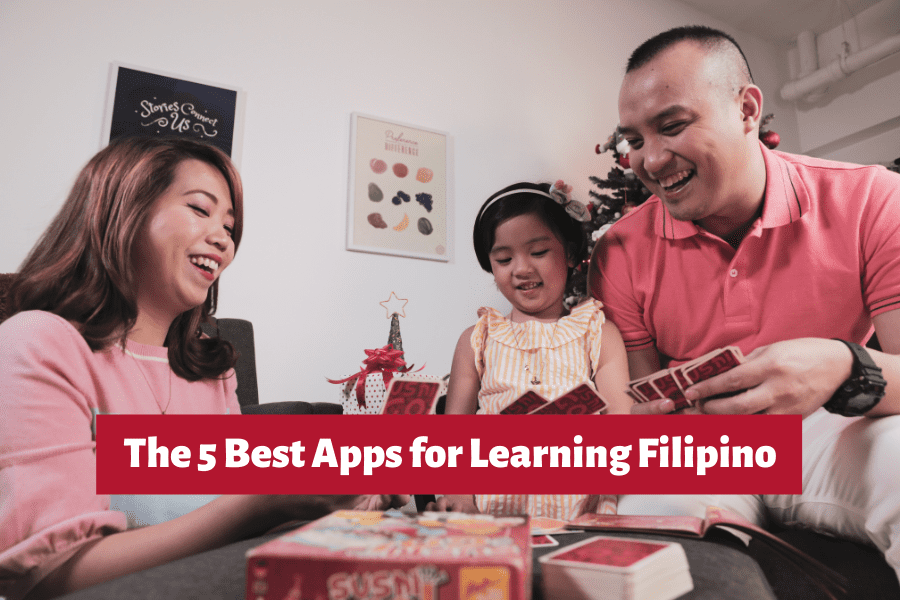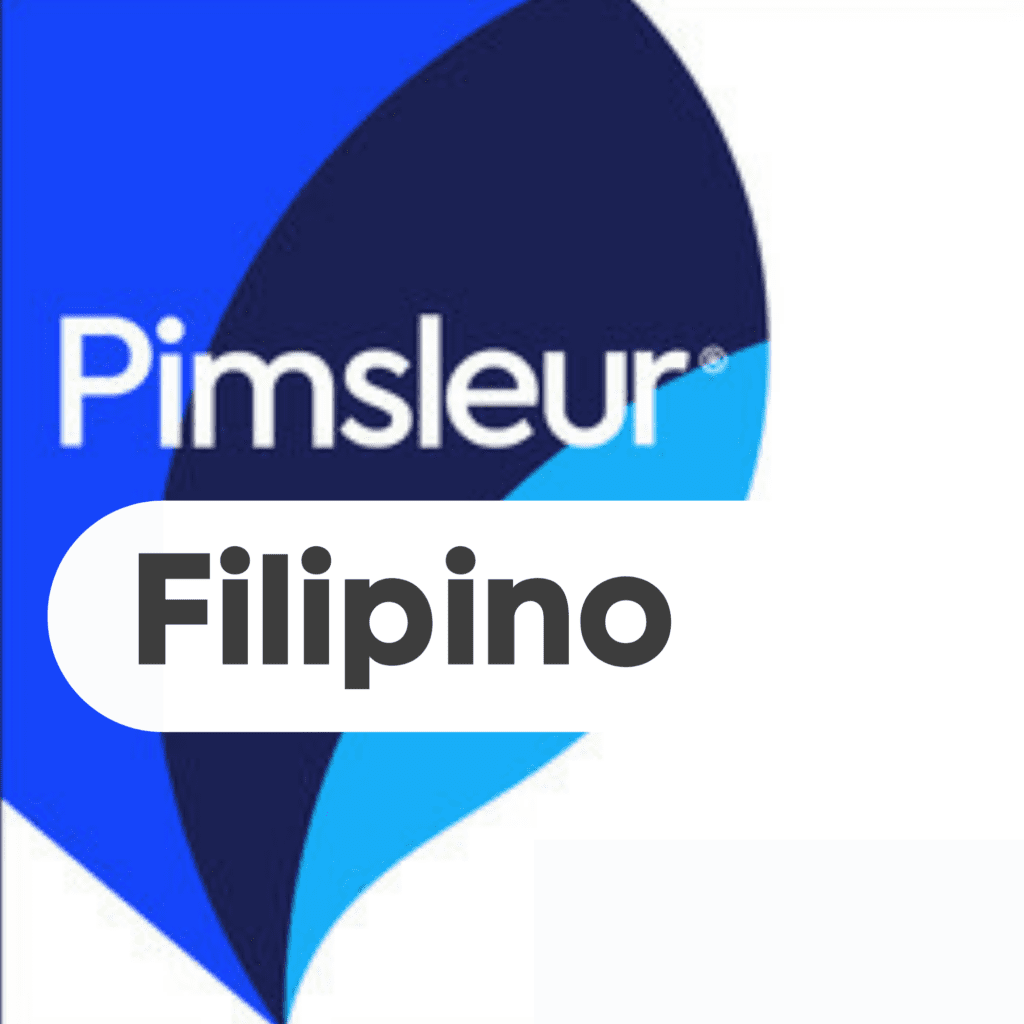- Editor's Choice
FlipinoPod101 boasts an enormous selection of video/audio lessons and a fully customizable syllabus.
- 2nd Choice
100% audio based, Pimsleur helps you to achieve an intermediate conversational level very quickly.
- 3rd Choice
Highly gamified & fun to use, Ling is packed with dozens of short ‘mini-lessons’ with interactive dialogues
For many, the Philippines is a place of paradise. Friendly locals, dreamy beaches and exquisite cuisine makes this unique country an ideal destination for travelling, with over 7000 islands to explore boasting some of the best natural beauty on Earth. But how important is it for you to learn the Filipino language?
Whilst it’s true that English is widely spoken in the cities, once you get outside the urban areas and really start to explore the country you’ll quickly discover that everyone speaks Tagalog, the official language of the Philippines.
Tagalog is a fascinating language, with a complex grammar system that’s vastly different to English. And yet, those who take the plunge and commit to studying it soon discover that it’s well worth the journey.
So, what’s the best way to learn Tagalog without actually being in the country? Which apps & language programs are the most effective and affordable to quickly get up to speed with Tagalog? Don’t worry, we’ve got your back. Read on to discover our list of top five apps for learning Tagalog (and a few more runners up at the end).
Are you ready to check out the best apps for learning Filipino?
‘Tara na!’ (it means ‘Let’s go!)
Best Overall – Most Comprehensive
Overall, the best app by far is FilipinoPod101. A subscription to the app grants access to an enormous library of video and podcast lessons, ranging in topic from travel to dating. The company behind FilipinoPod101, Innovative Language, has been around for a long time and it shows. Not only do you get high quality video lessons with full dialogues & transcripts, but a myriad of extra learning tools all tied up nicely into an intuitive and easy-to-use app.

FilipinoPod101 gives you the ability to fully customize your own learning by selecting specific learning ‘pathways’ from their vast lesson library. The pathway guides you through each lesson, completing exercises & focusing on specialised topics. Alongside the lessons you’ll find frequency word lists, flashcards, topical vocab lists, a word bank, and more. Plus, you can sign up today using our unique coupon code and get up to 77% off.
Pros
- The lessons cater to all levels and learning goals
- Content is fun and engaging
- All content can be downloaded for offline learning
Cons
- Can feel unstructured for those without clear learning goals
- The videos often use too much English (more immersion would be nice)
- The content gets a little sparse for the higher levels
Price:
Effectiveness:
User Experience:
Most Effective Conversational App
The Pimsleur app isn’t for everyone. It’s a rather heavy & intensive course that gets you up to a basic conversational level of Tagalog in a very short space of time. Each 30-60 minute lesson first introduces you to an authentic dialogue and then proceeds to deconstruct it into it’s basic phrases, words and sounds, whilst testing you throughout with a spaced repetition system of learning. It’s not cheap either, but it’s backed by decades of research and is a very effective tool for developing a fluent conversational level very quickly.
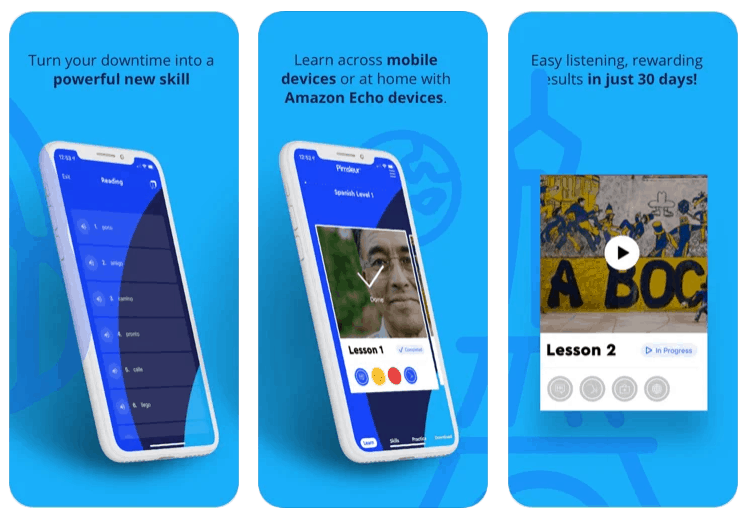
Pros
- The course is purely audio-based
- It's built upon years of research by Dr Pimsleur
- Comprehensive syllabus
Cons
- No focus on other language skills (only speaking & listening(
- Every lesson follows the same basic format
- The topics lack in diversity
Price:
Effectiveness:
User Experience:
Most Fun & Interactive
Ling is a highly gamified app for learning over 50 different languages (including Tagalog). It motivates you with the possibility to earn bananas, compete with friends and unlock new levels to complete, similar to how Duolingo operates. The basic version is free, and beyond that you’ll need a monthly subscription granting access to a whole library of lessons, games, activites and reading/writing exercises.
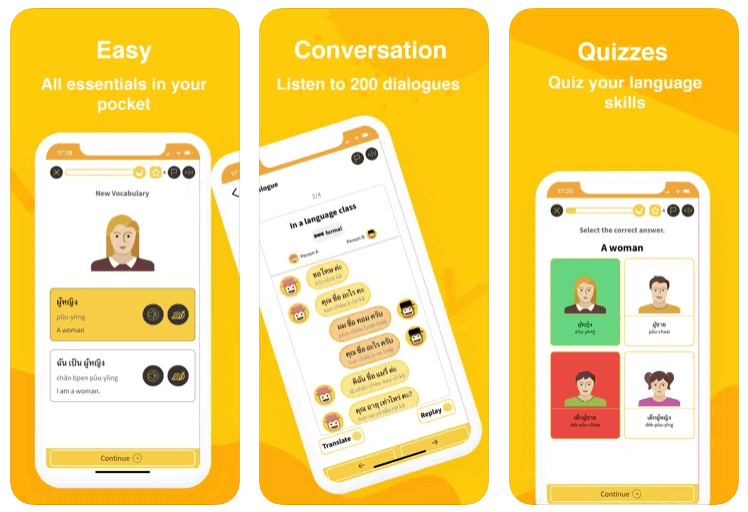
The lessons all incorporate high quality audio files, which includes the interactive chatbot that allows you to ‘talk’ with the app by selected pre-programmed responses. Overall, the effectiveness of the app is up for question since it’s mostly just passive learning (without any actual speaking or writing practice) however it certainly is very engaging & motivating, which is an essential ingredient to long term language success.
Pros
- Clean interface with lost of motivational features
- Lots of practical and realistic phrases/dialogues
- Very beginner-friendly
Cons
- Not very suitable for higher level learners
- It's not great at explaining the grammar rules
- The pro version is quite expensive
Price:
Effectiveness:
User Experience:
Most Cost Effective
Sometimes the best apps are those that are developed by native speakers, and certainly ‘Learn Tagalog by Dalubhasa‘ is well worth checking out. The app teaches basic vocabulary, phrases and grammar. It’s split into 5 levels, from beginner to expert, with the first two levels being completely free (after this you’ll need to buy a subscription). Whilst it starts off with very basic topics like colors, numbers, pronouns and conjunctions, the content quickly transitions into more colloquial Tagalog which is far more useful for everyday life & speaking like a local.

Pros
- Developed by a professional Filipino organisation
- Loads of content - right through to native level
- Audio is recorded by native speakers
Cons
- It's a bit slow to get into the actual useful content (for everyday life)
- The app interface doesn't work properly for some screen sizes
- The pro version is a bit expensive
Price:
Effectiveness:
User Experience:
Best for Conversational Practice
Italki is an absolute godsend when it comes to developing natural, conversational Filipino language skills. Students who use italki regularly find that their speaking confidence skyrockets and they end up enjoying the learning process much more, and therefore keeping up their motivation to maintain a study habit.
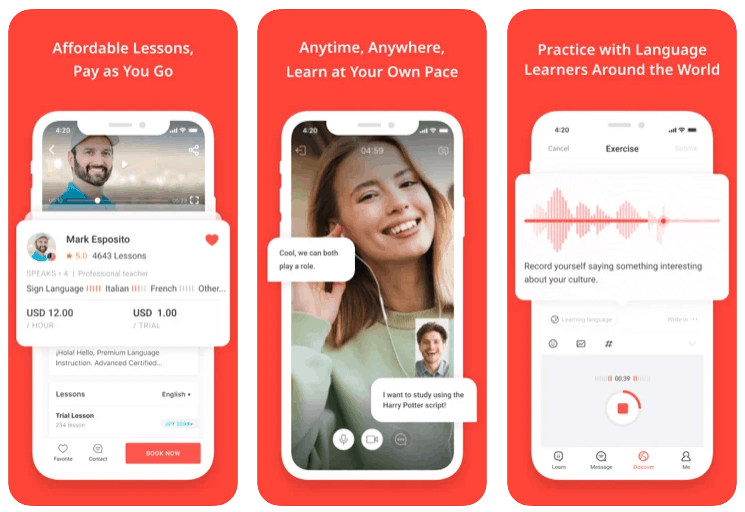
You can browse through the many hundreds of available tutors, book a trial class and get speaking right away. Don’t worry if you are just a beginner, the tutor will adjust their level to cater to your experience. Lessons are affordable and can be carried out on zoom, google or using their own built-in learning platform.
Pros
- Excellent for honing pronunciation and accent
- Flexible booking times
- Can focus on exactly what you want to practice or improve
Cons
- You should have a structure in mind of what to focus on
- Not all tutors have years of teaching experience
Price:
Effectiveness:
User Experience:
Runners-up for Best Filipino App:
Maybe these top five apps didn’t quite satisfy your tastebuds? Here’s some additional runners up that you might find more useful.
Memrise is a very popular option for learners of all sorts of languages, from Chinese to Hungarian. They’ve recently widened their market to loads of new langauges – including Tagalog. You can expect videos of native speakers, natural dialogues, gamified quizes & a nice user interface.
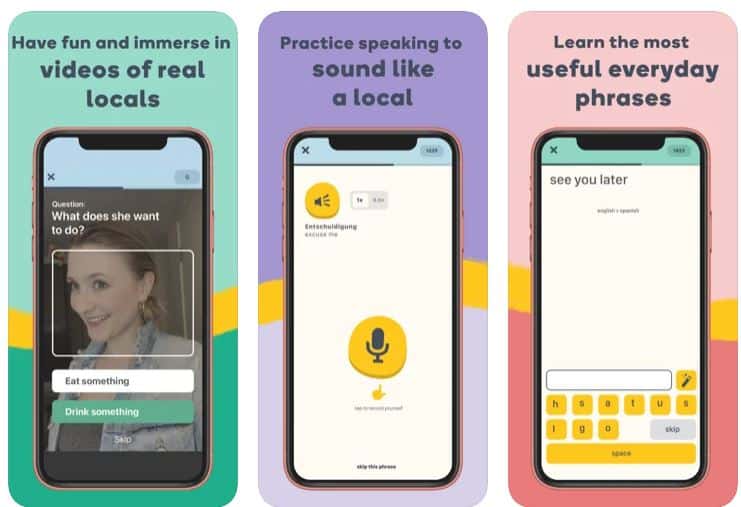
However, the app now allows you to choose from several difference courses that are created by independent course creators. This means that whilst the amount of content & variety is awesome, the quality does vary somewhat. So be a bit careful with this one. It’s also a bit pricer than the other apps we’ve mentioned so far.
Pros
- Immersive & fun to use - has videos, dialogues & lots of great content
- Tracks your progress & has lots of cool features to keep you on track
- Wide range of content to choose from
Cons
- Quality across courses varies somewhat
- Focused more for beginners - not enough advanced lessons
- Quite expensive
Price:
Effectiveness:
User Experience:
If you like the idea of practice with native speakers then you’ll love Tandem. Along with other similar apps (like Hellotalk), Tandem creates a digital space for language exchange students to connect. Rather like a social media site, you can fill in your own profile about your own interests and learning goals and then start messaging other students who share your same interests. The app will automatically pair you with someone looking to learn a language you already possess (English or maybe Russian, for example).
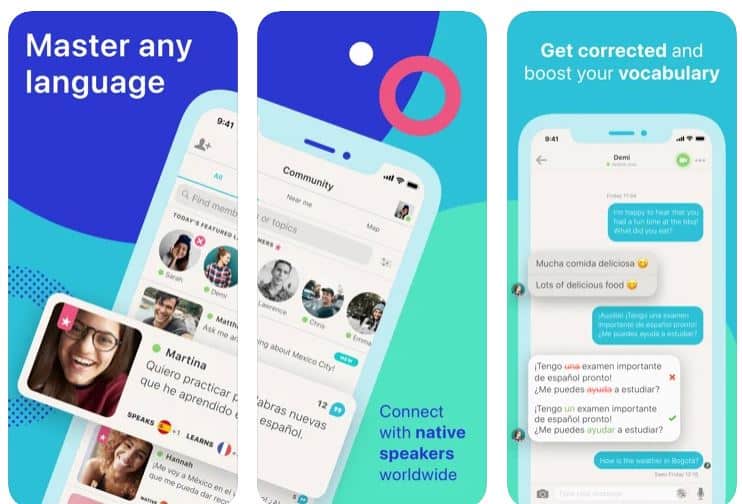
The app makes it easy to spend equal amounts of time speaking each others target language and even suggests conversational promts and questions to ask. It has a built in error corection feature to allow you to correct mistakes, plus a translate button – very handy! It can get quite addictive, I often have many language partners all on the go at the same time, but it’s a great way to get real exposure to the native language and make meaningful cultural exchanges.
Pros
- Great user interface
- Connect with people who share your same interests
- It's free!
Cons
- Language partners can be unreliable
- It's not a great substitute for experienced tutors
- It takes time to build up a good working relationship
Price:
Effectiveness:
User Experience:
Drops is a fun app for learning new vocabulary through games & activities. It follows a predominantly visually-based method of learning by assosiating words with images. Whilst there’s not much in the way of grammar, the short puzzles & word games can be a great way to build up your Filipino vocabulary.
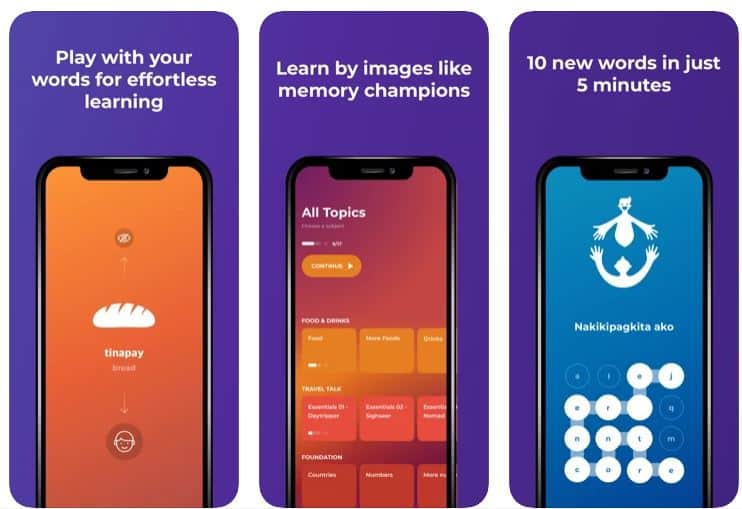
Pros
- Variety of games & activities
- Diverse range of word lists
- Reviews the words you've already learnt
Cons
- Doesn't teach any grammar
- The time limit for each game can be annoying
- The pro version is necessary to unlock all levels
Price:
Effectiveness:
User Experience:
Conclusion: The 5 Best Apps For Learning Filipino
If you’ve get anything out of this article I hope that it’s the fact that there’s loads of really cool apps out there for learning Tagalog. Now you have literally no excuse to get out there and start learning this beautiful language.
To recap, overall we recommend checking out FilipinoPod101 as our choice for the best app for learning Filipino. It’s both entertaining & very effective for learning Tagalog, providing you are disciplined enough to follow the learning paths through to their end. Couple this with an app for speaking like italki and your all good to go!
But most of all, try to find out which method works best for you, and have fun!

Josiah is a digital nomad with a passion for language learning and adventure travel. He’s taught English as a foreign language for many years and is currently learning Georgian, French and Chinese.
